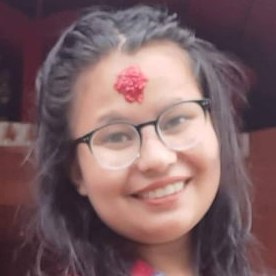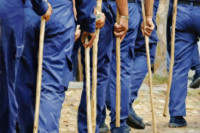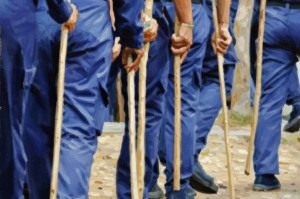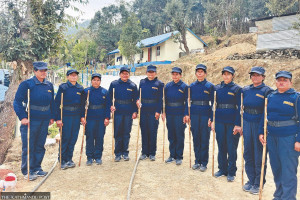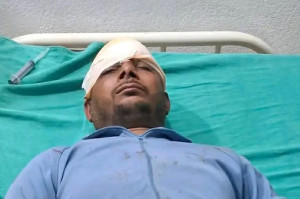Sudurpaschim Province
Rampant ambulance fees hit patients hard in Baitadi
A majority of the ambulances, in government and private hospitals, in the district charge more than what is fixed by the District Ambulance Committee.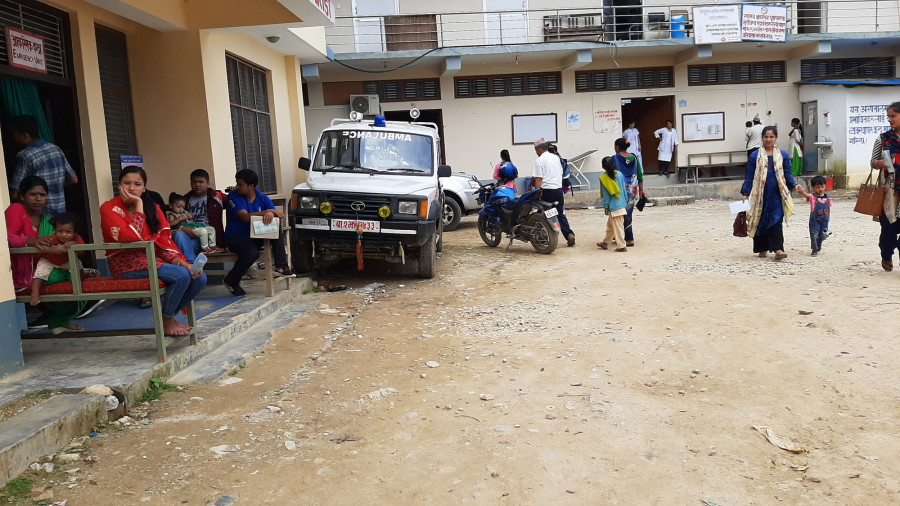
Tripti Shahi
On Wednesday, doctors at the Baitadi District Hospital referred Bhuwan Karki’s neighbour from Dogadakedar to the Dhangadi-based Nawajiban Hospital. The patient needed to be ferried to the Nawajiban hospital immediately. Karki asked to use the hospital’s ambulance but was taken aback by the fare. The ambulance of the District Hospital would charge him Rs 12,000—a steep price for a seven-hour ride.
“We finally arranged for an ambulance from Patan Primary Health Centre. They charged Rs 9,000 after much haggling,” said Karki.
The District Hospital refers at least 12 to 13 patients per day to various hospitals in Dhangadi, Kohalpur, and Nepalgunj, among other places in Surpaschim Province, according to health workers at the hospital.
Karki is one among the many service-seekers in Baitadi who suffer because of the rampant fees charged by ambulance operators.
A majority of the ambulances, in government and private hospitals, in the district charge more than what is fixed by the District Ambulance Committee, said Saraswati Nepali, a woman rights activist in Baitadi.
“Shahid Dasarathchand Smriti Prathisthan’s ambulance demanded Rs 22,000 to go to Kohalpur in Banke from Dasarathchand a few days ago,” Nepali said. “We bargained with the ambulance driver and we finally settled for a sum of Rs 18,000. But we later sent another patient and his attendants to Kohalpur in Patan Primary Health Centre’s ambulance for Rs 12,500,” said Nepali.
A few days ago, one of the ambulances run by the Ambulance Operators Association, an umbrella organisation formed by various organisations working in the social sector in the district, asked for Rs 25,000 to ferry a patient from Baitadi to Kohalpur, said Sushila Chand, a relative of the patient. “We bargained and paid Rs 20,000—at that moment we had no choice,” she added.
Four years ago, the Ambulance Management Committee led by the chief district officer had put a cap on ambulance fares in the district based on the distance to cover. According to the committee’s decision, an ambulance can charge Rs 4,300 for a trip from the Baitadi district headquarters to Dadeldhura; Rs 8,900 to Dhangadi, Rs 16,800 to Kohalpur and Nepalgunj. But no ambulance driver in the district abides by the decision, said Nepali.
Currently, there are 12 ambulances in Baitadi district including two at the District Hospital and one at Patan Primary Health Centre. The rest are operated by private entrepreneurs and local units. There were only three to four ambulances in the district two years ago. But, after the formation of local governments, almost all of the 10 local units have purchased ambulances to serve people of their areas. However, the ambulances operated by the local units too do not adhere to the fixed rate, said Karki.
Khemraj Bhatta, a health worker at the District Hospital, agreed that there’s no uniformity in ambulance fares in the district. He said, “A meeting of the hospital staff is yet to declare ambulance fares officially.”
Yogesh Bhatta, chief at the District Health Office, says they have been receiving complaints regarding the expensive ambulance fares. “We are soon going to hold discussions with the ambulance operators to solve the problem,” said Bhatta.
According to the Ambulance Service Operation Guidelines (fiscal year 2016-17), an ambulance operator cannot fix rampant fares and should help operate medical services in a systematic and efficient way. According to the directives, ambulances are categorised into three groups—A, B and C—based on the installed flashing lights and sirens. A vehicle should be a four-wheel drive and should have air suspension and cold chain system with the word AMBULANCE visibly written on the back and front of the vehicle, for it to qualify as ambulance, among other guidelines to follow. Anyone found flouting the directives will be booked and his or her licence to operate an ambulance scrapped.
Lokendra Singh Negi, assistant chief district officer, said the local administration will take action against the ambulance operators if they charge more than what is fixed by the Ambulance Management Committee. “We will soon fix the new rate of ambulance fares after holding an all-party meeting,” said Negi.




 9.83°C Kathmandu
9.83°C Kathmandu